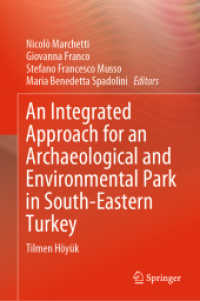- ホーム
- > 洋書
- > 英文書
- > Religion / Ethics
Full Description
Most of the articles were presented and discussed at the seminar Early Christianity between Judaism and Hellenism at the Annual Meeting of the European Association of Biblical Studies in Piliscsaba and Budapest, Hungary, in August 2006.
The anthropological quest is still one of the classical approaches in historical-critical as well as in other methodological approaches to the New Testament. The complexity of anthropological ideas in the New Testament is seldom presented neither explicitly nor in clearly defined terms, but rather in stories about human beings or their (inter-)actions and/or parenetic teaching that is based on some, often unstated, presuppositions of what humans are like. The different essays in Anthropology in the New Testament and its Ancient Context are taking care of this complex situation and address a selection of important problems from the variety of ideas on anthropology in Early Christianity as well as in its Jewish and its Hellenistic context. The book does not aim to show a coherent New Testament anthropology as it is to write a coherent New Testament theology, but rather tries to present new insights into the complexity of ancient anthropological discourses. With that aim the collection includes presentations on the human body and its purity ¿ a key feature in many ancient cultures and their anthropological systems, questions of purity and impurity, on the key anthropological terms sarks and sôma in Paul, how a Greco-Roman reader would understand Paul's anthropological reasoning. Paul's anthropology is also set in relation to Philo's view of humanity. Platonic, tripartite anthropology is also part of an article analyzing the common elements in the teaching concerning the human soul among Sethian, Valentinian and Platonic writers. Conversion, another kind of adaptation of a Hellenistic philosophical concept to early Christianity, different early Christian ideas of the resurrected body, and so-called ¿sepulchral anthropology¿ are further subjects addressed in the book which finally deals with selected anthropological imagery in the Gospel of John and with anthropological perspectives in Hebrews.
The book contains contributions by Ida Froehlich, Tom Holmén, Lorenzo Scornaienchi, Martin Meiser, George van Kooten, Päivi Vähäkangas, Miguel Herrero de Jáuregui, Outi Lehtipuu, Imre Peres, Margareta Gruber and Walter Übelacker. The essays offer some new angles, new methodological approaches and important insights relevant to anthropological views in the New Testament.








